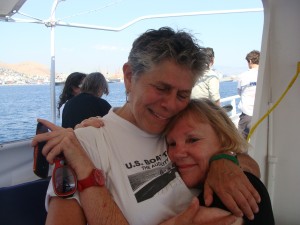 Maan News Agency, July 21, 2011
Maan News Agency, July 21, 2011
Early Tuesday morning, the Israeli navy overtook the Dignite Al Karame. A French-flagged boat, it was the only vessel of the flotilla that managed to reach international waters.
The Dignite Al Karame’s attempt to challenge Israel’s illegal blockade of the Gaza Strip came a month after the largest ship, the Mavi Marmara, withdrew from the flotilla.
The organizers cited “technical problems which were caused by Israeli attacks last year,” referring to the 2010 raid, during which Israeli soldiers killed nine activists.
Eight of the dead were Turkish nationals. One was a Turkish-American.
Some observers believed, however, that the “technical problems” came in the form of Israeli diplomatic pressure. While the Turkish government did not explicitly forbid the Marmara from sailing, Foreign Minister Ahmet Davutoglu warned activists to act “carefully.”
Shortly after the Marmara pulled out of the flotilla, Turkish officials told Hurriyet, Turkey’s English daily, that the relationship between the two countries was growing warmer.
Already tense relations between Turkey and Israel came under additional stress in January 2010, when Israel’s Deputy Foreign Minister Danny Ayalon seated Turkey’s ambassador to Israel in a low chair during a television appearance.
The deadly raid on the Mavi Marmara, which came some five months later, made the connection between Israel and Turkey, its sole Muslim ally, even icier.
After the Mavi Marmara pulled out of the 2011 flotilla, the movement was beset by an array of problems.
Organizers allege that two of the 12 remaining vessels were sabotaged.
False complaints that the ships were not seaworthy were lodged by Shurat HaDin Israeli Law Center, a Tel Aviv-based group that describes itself as a civil rights organization and “world leader in combating the terrorist organizations and the regimes that support them through lawsuits.”
While the Israeli army claimed that the flotilla had connections to terror organizations, the Israeli daily Haaretz reported that, according to a government source, “Security officials and Foreign Ministry representatives informed the cabinet … that Israel has no information indicating that terrorists or anyone affiliated with a terror group is planning to take part in the flotilla …”
Despite this, Israeli army officials continued to insist that two of the activists had ties to Hamas and that flotilla organizers were stockpiling chemicals that would be used against the soldiers who would overtake the boats. The army also stated that “some of the flotilla participants clearly intend a violent clash.”
Although several small vessels have successfully broken the blockade in the past, Israel maintained that it would have to stop this flotilla — which it called a “provocation” — by any means necessary.
Tuesday morning, 150 Israeli soldiers were deployed to stop the Dignite Al Karama, a yacht that held ten activists and six journalists. Activists did not use chemicals or violence against the Israeli navy when it boarded.
In addition to mounting an aggressive media campaign against the flotilla, the Israeli government put the media itself in the crosshairs by stating that journalists who covered the attempt to break the naval blockade of Gaza would be barred from Israel for 10 years.
The announcement prompted the Foreign Press Association in Israel to state that the threat “sends a chilling message to the international media and raises serious questions about Israel’s commitment to freedom of the press.”
Israel retracted the media ban the following day.
Throughout the ordeal, activists remained undaunted by Israel’s threats. The Greek government, however, bowed to them, despite its publicly stated opposition to the blockade. Both the parliament and the Coast Guard issued orders forbidding boats from sailing to Gaza.
he US boat, which was named the Audacity of Hope, defied these orders, pulling out of an Athens-area port on July 1. It was stopped by the Hellenic Coast Guard shortly thereafter and was escorted back to shore.
The Canadian ship, dubbed the Tahrir, met the same fate a few days later.
Although many activists have returned to their home countries, organizers insist that they will not abandon their efforts to sail to Gaza.
In Athens, before it was clear that the boats would be sidelined by the Greek government, organizers deemed this year’s flotilla a success, saying that it had brought media and public attention to the Israeli blockade of Gaza.
This writer has attempted to assess whether the American public is indeed more aware of the blockade than it was before the flotilla. Man-on-the-street interviews reveal mixed results.
One young man, the manager of a café, had read about the flotilla in the local newspaper, a subsidiary of The New York Times. He called the attempt to break the Israeli blockade of Gaza “awesome”.
While many of those who monitor the mainstream media have heard of the flotilla and the blockade, most still don’t understand the blockade and the impact it makes on the 1.6 Palestinians who live under the closure.
And with the United States in an economic crisis, and citizens feeling the downturn, many Americans confessed to this writer that they avoided the news in an attempt to keep their spirits up.
*Photo: Mya Guarnieri. Activists on the Us Boat to Gaza, the Audacity of Hope, hug and cry moments after it leaves an Athens-area port on July 1.